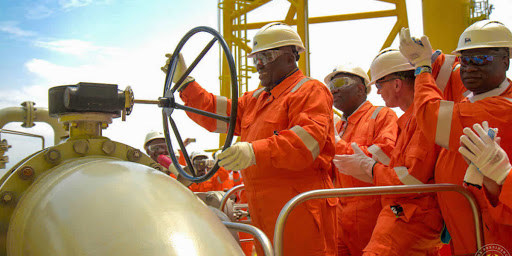…as 450 local workers face job losses
The country’s bid to ensure that locals play a key role in the oil and gas industry is set to face major setbacks due to disruption caused by the Coronavirus pandemic and the collapse in oil prices.
The industry, over the past six years, has made steady progress in pushing for more local content in the sourcing of goods, services and labour, as new oil and gas investments came on line; however, the COVID-19 crisis has led most exploration and production firms to cancel contracts with local businesses.
For instance, the pandemic coupled with current low oil prices has resulted in the cancellation of about 98 contracts worth over US$389million awarded by Aker Energy, AGM, Eni and GOSCO, in what is seen as a blow to local content development in an industry heavily dependent on foreign expertise and raw materials.
The sector’s regulator, the Petroleum Commission, had also hoped to localise 40 roles in the industry this year, per its localisation plans; but this too has been put off by the crisis.
“The industry has chalked modest success in localising various positions, including critical positions in major companies. Per the various localisation plans, the Commission expected about 40 roles to be localised this year,” the Commission’s Chief Executive Officer, Egbert Faibille Junior said, stressing that the impact of COVID-19 will have serious ramifications on local content development in the country.
The consequential effect of cancelling contracts in the industry, the Commission said, “resulted in layoffs of both expatriate and local personnel”
In all, the sector’s regulator estimates that over 450 Ghanaian workers in Aker Energy, Tullow, Schlumberger, Halliburton, Baker Hughes will lose their jobs as a result of the pandemic.
“Similarly, contracts previously awarded by Eni and Tullow were due for renewal, and tendering processes in respect of such contracts had begun. The cancellation of these contracts – such as the five-year Maersk Drilling contract that was terminated in June 2020 together with associated services – will have a devastating toll on local businesses,” Mr. Faibille Junior added during a webinar organised by the Africa Centre for Energy Policy.
On the way forward for local content development, he advocated the need to create a new era in local content practice in the age of COVID-19. “Even in the throes of what is perhaps the most severe economic shock in a century, there is little doubt that the crisis will bequeath a ‘new world order’ when it comes to supply chain management in the oil and gas industry.
“For us – the regulators, policymakers, corporate leaders, and supply chain managers – the key will be to ensure that we neither over-react nor return to the status quo: the status quo of traditional global sourcing from a few established companies located either in Houston, Aberdeen, Singapore or Stavanger. Getting that balance right will be the difference between winning and losing the war against COVID-19 for many countries and companies.”
Additionally, he believes that COVID-19 is challenging international oil companies’ model for sourcing goods and labour in global supply chains, and the pandemic presents a unique situation which the country must exploit. “We as industry players must now start to frame out new approaches to oil and gas supply chain management which acknowledge the risks associated with new global economic threats such as COVID-19 – and other pandemics yet to be born.”
Gov’t to initiate steps to protect investments E&P companies
As part of efforts to help Exploration and Production (E&P) companies cut down their losses, Mr. Faibille Junior revealed that government is willing to look at the impacts of COVID-19 on operations of E&P companies and come out with initiatives to protect their investments.
He further noted that steps are being taken to “strengthen safety policies and measures in companies to ensure safe and secure environments for workers. The Commission has instituted a weekly health, safety and environment briefing by the operators on the pandemic’s status and safety issues in operations.”










